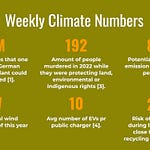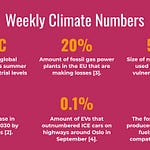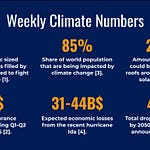Welcome to this week’s edition of The Weekly Climate 🎉
References: [1], [2], [3], [4] and [5].
The title for this weeks issue is taken from the 4 adaptation posts included in this weeks newsletter. Mother nature does indeed seem to punish us for our atmospheric intrusions these days. It’s weeks like this when we can really see the brunt force of mother nature that really makes one wonder if we are so much in control as we think (hint: I don’t think we’re in control at all).
That’s why I want to start out talking about a board game. Seems odd perhaps but let me explain. A very interesting Kickstarter launched last week and it’s a board game called Solutions*. It puts you and your friends at the helm of solving the climate crisis. Like Heated puts it this week: “What can I do? Anything” and this game goes out of it’s way to help you figure out what that “anything” could be. Because not only will you and your family/friends learn about the solutions to the climate crisis, but you will also be giving an easy way to act if a particular solution inspires you. And if these past weeks of heat, flood, drought and fire has taught us anything it’s that it’s all hand on deck now. And this is the other big problem that this game solves. It engages anyone in trying to help solve the climate crisis. Even your stubborn old uncle Bob who thinks climate change is load of bull-💩 and your other uncle John who just don’t give a 💩. No amounts of heated dinner discussions will convince them of anything. But perhaps a game will. At least through play they will be forced to learn about the realities of climate change and the solutions to it. Oh and just in case you think it’s just some random game about climate change, Paul Hawken, the founder of Drawdown and Regeneration endorses it.
Needless to say I got one and can’t wait to try it out. Thanks to Sam and Mehrad for all your hard work on this and if you’re interested you should check it out here.
Other than it was a bit of an unusual week news-wise. There was a lot of policy news and details about all the climate disasters that are happening around the world, but few important ones on most other topics I usually cover.
*Full disclosure: The team was a finalist in one of my other climate projects Massive.earth’s very first Challenge program, however, I have no financial interest or other association with the team apart from being a big fan.
‼️News you can’t miss
Here’s one important scary/bad (🙀), good (😻), interesting (😼) and fossil (💩) news item.
🙀 A new study confirms that the Amazon is now a net source of CO2 emissions and not sink.
😻 EU VC investments in cleantech shattered all records in the first half of 2021 coming in at 7B€ almost twice that of the former annual records.
😼 A great rallying cry from Heated that I hope will inspire everyone who’s not yet doing something for the climate.
💩 The fossil gas industry vs energy efficiency policies.
👩⚕️ Status: Climate & Science
Let’s look at how we’re doing this week!
[#hurricanes] — A new study concludes that the recent increase in hurricanes represents a radical deviation from a 1960-1980s lull. The authors have found evidence that this increase in hurricane number and strengths seem to be on a rebound due to man-made air pollution.
📰 The 7 Grand Challenges
⚡️Decarbonize Electricity
Clean electricity is the one do-or-die challenge we must solve.
[#iea] — A new report released by IEA predicts that electricity consumption, which dropped, during COVID, will rebound sharply in 2021 with an increase of 5% and 4% in 2022. More than half of this growth will come from China, which likely means that about half of that increase in electricity production will come from coal. The report makes it clear that although renewable energy deployments have increased rapidly in recent years it’s still not where it needs to be.
🏘 Reduce impact of urban and rural areas
Lowering the impact of urban and rural areas.
[#electrification] — A great and hopeful post by Saul Griffith explaining what we (in this case focussed on the US, but could be applied to all of the global north) must do to solve the climate crisis. 42% of the climate problem can be solved by making the right purchasing decisions at a household level. And in this post Saul counts all the devices we need to replace. All 1billion of them. And that’s just in the US. This needs to be happen everywhere of course.
🛁 Clean non-electrifiable activities
Some activities we do today can’t be electrified, these must be cleaned some other way.
[#aviation] — Boeing, Alaska Airlines and NOAA has joined forces to measure greenhouse gas emissions of airplanes mid-flight. This will provide scientists and policy makers with more concrete data points for which the latter probably won’t use for anything. But still the science part seems important.
🌳 Protect and grow nature
Nature is our ally, we must protect it and help it help us.
[#bluecarbon] — A new study maps the so called “blue carbon wealth” which is the carbon sink contributions from various ocean based carbon sinks mapped to individual countries. In short the study shows that Australia, Indonesia and Cuba has the most blue carbon wealth. But only a handful of countries have enough blue carbon to offset their emissions.
[#australia] — And related to the study on “blue carbon wealth”, environmental groups are urging the UN to put the Great Barrier Reef on it’s “in danger” list which the Australian government is opposing heavily. The environmental groups refer in their letter to the mass bleaching (coral dying) events of 2016, 2017 and 2020.
[#amazon] — A new study using planes that has sampled the air above the Amazon has determined that the rainforest is now releasing more CO2 than it stores. This has long been speculated by climate scientists that this would happen some time in the future but this effect has now already been detected in huge country sized swaths of the Amazon.
[#greenland] — A new report confirms that the Greenland Ice Sheet appear to be melting at it’s highest rate in the last 12.000 years. But that’s not the scary part. The scary part is how fast the rate of change is happening.
📦 Other / catch-all
All the other stuff that I couldn’t fit into any of the other categories, than the other category.
[#rallyingcry] — I really enjoyed this rallying cry of a post from one of my favorite climate journalists, Emily Atkin. She sums up all that is happening right on many people’s doorstep (focussed on the US, but she might as well have added the floods in Germany this week, or the burning tundra in Siberia, record shattering heatwaves in Norway etc). These things are happening to everyone and it doesn’t have to take much to make a difference. Read her post for your weekly dose of inspiration and do what you can.
[#investing] — A new quarterly report by Breakthrough Energy founded “Cleantech for Europe” reports that the first half of 2021 has seen a record shattering level of VC investments in cleantech: 7B€. The previous annual record was 4.1B€. With 6 months left to go this seems like quite a jump. The report mentions that although a very good sign and a (still vanity metric though, red.) kudos to the EU cleantech venture community that EU policy frameworks is still needed to be able to support even further investments and development in the sector.
[#book] — Here’s a book review by Ezra Klein on the book “How to blow up a pipeline” about the role of activism and how activism could and (according to the author of the book) should have a more violent angle.
[#reduceremove] — Here’s a great and clear post from Grist’s Ask Umbra series on why we must both stop emitting and remove carbon from the atmosphere. Highly worth a read if you’re still confused about why we must do both.
⭐️Special Topics
🎩 Global and local policy
We have a special interest in covering the major global and local policies regarding climate, whether good or bad.
[#covid] — A new report has analyzed the bailouts spent during COVID and concludes that out of the 17T$ spent globally only 10% of that was used in a way that helped reduce greenhouse gas emissions.
[#fitfor55] — The EU introduced it’s #fitfor55 package of law proposals last week. And it’s a mixed bag. Some call it ambitious, others not so much. It doesn’t definitely contain some good things like banning fossil cars by 2035, including shipping in the emissions trading system and a import tax for steel, cement and other polluting products. Yet among some of the most worrying elements are the fact that under the new laws trees can still be burned to produce energy. Right now the #fitfor55 package are just proposals and if it goes as it always does fossil & co lobbyists will thwart the most ambitious and necessary parts of it. Pardon my negativity here, but we’ve seen enough of these handwavy proposals in my mind.
[#china] — Last week, China opened it’s national carbon emissions trading market, similar to many carbon emission trading markets around the world. It’s seen as an important step to help China curb it’s emissions. Will be interesting to see, although these markets doesn’t really seem to have had a very big effect on emissions just yet…
[#responsibility] — More than 100 leaders of countries from the global south is (once again) urging leaders of rich nations to curb emissions faster. They’re not asking for much. After all, we caused the problem, so of course we have to fix it — especially as these countries will stand to suffer the most.
[#ranking] — A new report has analyzed the NDCs submitted by countries around the world and conclude that few (especially the rich one’s) are doing enough on climate change and health as well. A couple mentions targets but no or little concrete in terms of actions to take.
[#biden] — A new report highlights one key item that was left out of Biden’s infrastructure bill and that’s a clean energy standard that would force utilities to start replacing dirty energy sources with clean ones. The report calculates that such a standard would enable Biden to get to 80% of the net-zero goal by 2030. Sadly, the standard was left out in a compromise with the Republicans.
[#lobbyism] — The forestry industry, in particular, the Swedish Forestry Industry, has heavily criticized a new EU forest strategy (as one would expect when an industry is being hit by the realities of some necessary climate solutions). In this letter 62 researchers counters the forestry industry’s criticism by saying there’s no research evidence to support their claims. Great job.
[#lobbyism] — 92% of S&P 100 companies have stated clear carbon emission reduction pledges these recent years. At least verbally. When it comes to action. Not so much. In fact, 60% of the S&P 100 companies have been caught lobbying against measured that would make achieving their carbon emission reduction pledges cheaper. This seems very much at odds with any kind of business sense.
[#biodiversity] — The UN is working on a new accord that sets out clear target for new biodiversity goals post-2020, after the 2020 goals completely failed. While the targets looks right to most experts its also clear that with out concrete tasks and national accountability the chance that the targets will be achieved will be extremely low.
🛡 Adaptation
Adapting our civilization to the coming climate crisis is vital. Here we cover various ways that is happening (or isn’t).
[#managedretreat] — One key adaptation measure that many cities will likely need to employ in the coming years is so called managed retreat. Managed retreat is when an entire city (or a large portion of it) is moved to some other location for the simple reason that the old location was facing too severe climate disasters. This could be due to wildfires, flood or sea level rise. As I have highlighted before though at least in the US there’s an issue with insurance here as many insurance companies only pay if a particular house or building is built in the same location as it was destroyed in. This limits the places a city can go quite a lot. This article looks at a city who did it anyway.
[#heat] — An analysis of US cities have mapped the heat trapped in cities vs it’s surrounding areas. Here cities like New Orleans come up at the top with the highest difference between city and surrounding areas. New Orleans is on average 5C hotter than it’s surroundings. Lots of factors play into this such as the amount of dark colored areas in a city, the amount of green spaces etc.
[#wildfire] — A firenado is a new thing that humans created by causing the climate crisis, and yes it’s exactly what it sounds like: A tornado but with fire. California saw two of those last week. That article also gives a good overview of the current blazes in California. Even Hawaii is facing severe blazes . Russia is even sending in the army with water bombing planes to try and put out the fires in Siberia that have spread to more than 800.000 hectares in recent weeks. If you want to dive deeper in to the wildfires in the West here’s a dynamic map over the wildfires currently burning out west and the corresponding air quality.
[#drought] — Droughts are having real tangible impacts on people’s lives in the US these days. In particular if you’re a farmer who rely heavily on a steady flow of water. A farmer in Ledoux, N.M, for instance has seen his production of hay drop from 6000 bales to 300. The reason, drought has caused a relentless drop in snowmelt over the past years.
[#flood] — Detroit has experienced it’s second 500-year flood in just 7 years (one in 2014 and another just end of June this year). Think the universe is telling us something? The one in 2014 caused over 1.4B$ in damages. They also had major flooding events in 2016, 2019 and 2020. Also last week, central Europe was hit with severe floods. In Germany alone more than 1300 people is missing and towns have been destroyed.
⛽️ Major Carbon Emitters
We have a special interest in covering the moving of the major carbon emitters as these are the key roadblock to climate action.
[#lobbyism] — Remember that time when two senior Exxon lobbyists laid all of Exxon’s lobby strategies bare? (If not, then see this). In those videos they mention 6 Democrats and it turns out that Exxon paid them nearly 333.000$ in donations.
[#health] — Three chemicals used in fracking will decay into so called PFAs which are super toxic to humans and animals and will likely stay in the nature forever. These were ok’ed under Obama’s EPA despite the fact that EPA knew of the risks. And it’s not just those who happen to live close by these sites, but certainly also the workers at the drill sites that are at risk.
[#fossilgas] — A great investigative piece by Grist who looks into how the fossil gas industry publicly looks like it’s supporting things like energy efficiency but in secret it’s derailing policies that will keep inefficient and dirty fossil gas boilers in the market.
That’s it for this week folks!
Remember if you’re feeling down, angry or sad from some of the news in this newsletter one cure is to act. And one way you can always act that also happens to be one of the most powerful things you can do is to talk about it. That also works if what you just read made you hopeful or happy btw.
If you enjoyed this newsletter don’t forget to share it with your friends, coworkers or other people you think could benefit from getting it. If you got directed here by a friend or another link on the Internet don’t forget to subscribe!
See you all next week 👋












